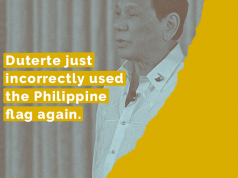While Malacañang views the signing of an executive order to end contractualization on May 1 as a “gift” to workers, some of the workers felt they were deceived.
One of the main campaign promises of President Rodrigo Duterte was to put an end to the normalized contractualization of workers, popularly known as “endo,” short for a temporary employee’s “end of contract.”
Endo or end of contract is the practice of giving an initial six-month contract before making a new employee into a regular one with benefits.
On May 1 as the laborers gather in protest against perceived government inaction, the chief executive signed Executive Order 51 that supposedly assures the workers’ security of tenure.
The move, however, did not put to a halt grievances of labor groups who saw “nothing new” with the EO. They said it only gives “false hope” to workers.
Some Filipinos also echoed this sentiment on social media.
With regards to illegal contractualization. They can't do anything with the EO. They should've trashed the labor contracting law.
— André (@andrgmr) May 2, 2018
Ay, bobo lang ang senador na ito. Dati nang may batas vs illegal contractualization. Ang hinihingi ng labor groups at mga mangagawa ay wakasan ang non-rehiring ng mga natapos ang kontrata bilang regular na manggagawa.
Hirap ba intindihin noon o may pasak na barya ang tenga niya? https://t.co/oGtDaHfTNm
— Fray DDS (@ProDeoEtPatria7) May 2, 2018
Others recall the pending Senate Bill 1392 authored by Sen. Joel Villanueva seen as a definitive way to end the short-term contracting of low-income Filipino workers. Villanueva was the former director-general of TESDA.
This proposed legislation was once touted as an alternative to ending ENDO while remaining sensitive to business concerns. https://t.co/ogH5QAPvbL
— oli r. (@ohlistic) May 2, 2018
The senate bill, once passed into law, will revise the National Apprenticeship Program to be implemented by the Technical Education and Skills Development Authority.
More questions over Duterte’s EO
There are those who took the time to explain that the president simply reiterated what was written in the Labor Code.
“Illegal contracting or labor only contracting has always been prohibited by law; legitimate job contracting has always been allowed by law. No executive order can overturn that,” one Twitter user posted.
According to the Partidong Manggagawa, the president did not consult with the draft they had sent to the Office of the President last April 13.
“If President Digong wanted to fulfill his promise of ending ‘endo’ he should have signed the 5th draft of the workers’ EO that would make direct hiring of workers to principal employers a norm,” PM chairperson Rene Magtubo said.
Improved apprenticeship: An alternative to ‘endo’?
The proposed bill, known as the Apprenticeship Training System Act of 2017, will “establish an apprenticeship program” of at least six months—the same period of time a casual worker is hired under contract.
Based on Section 3 of the act, the legislation will help a student meet the demands or the criteria of employers to have the “best-fit, competitive and trained human resource” in the future.
After passing the six-month training period, the apprentice will “graduate” and will be given a national certificate that is equivalent to the unit credits of undergraduate studies.
This will help employers see their value to the company, agree to hire them for a regular position and avoid resorting to “endo” schemes. It will also allow employees to skip the six-month probationary period required for regularization.










